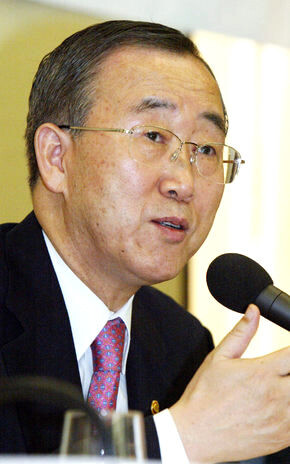hankyoreh
Links to other country sites 다른 나라 사이트 링크
[Interview] Ban Ki-moon says ’action plan’ exists in face of N.K. nuclear test

"South Korea has begun working on a concrete action plan for North Korea’s possible test of a nuclear weapon," said Minister of Foreign Affairs and Trade Ban Ki-moon during an August 31 meeting with journalists in Seoul.
"Should the North go ahead with the test, it will threaten the security of all of Northeast Asia and ruin the weapons of mass destruction (WMD) non-proliferation plan."
Regarding Ban’s remarks, a government official said, "There has been no discussion on joint countermeasures between South Korea and the U.S., but the two allies will start consultation over [a possible] North Korean nuclear test."
In connection to Japan’s upcoming election for prime minister, Ban stressed that dialogue between the two countries "has stopped. It is important that the Japanese next leader has an awareness of history and the [meaning of the] Yasukuni Shrine." The shrine is a controversial commemoration of Japanese war dead, including Class A war criminals. Current prime minister Junichiro Koizumi has been criticized for his regular visits there.
Asked about the possibility of Japanese Foreign Minister Shotaro Yachi visiting South Korea, Ban answered, "If he visits Seoul, we will welcome him, The 6th South Korea-Japan exclusive economic zone (EEZ) will open in Seoul between September 4 and 5," he added.
In relation to the South Korea-U.S. summit due to open in Washington on Sept. 14, Ban said, "Unfortunately, there can be a number of perception gaps between Seoul and Washington. The upcoming summit is important. Once a perception is formed, it is difficult to remove it. The urgent thing is to dismiss it," added Ban, preferring to remain general as to which ’perception gaps’ he was referring.
One probable gap that the minister was referencing is the controversy over transfer of wartime operational control from U.S. Forces Korea (USFK) back to South Korea. Regarding the issue, the foreign minister said, "We have four principles [involved in the handover], and the U.S. agreed to them." The four principles are maintaining the South Korea-U.S. mutual defense treaty signed in 1953, the continued presence of the USFK and guaranteed dispatch of additional American troops during wartime, continuous informational and intelligence support from the U.S., and maintaining joint war deterrence and arranging joint preparatory measures on the Korean peninsula.
Editorial・opinion
![[Editorial] Penalties for airing allegations against Korea’s first lady endanger free press [Editorial] Penalties for airing allegations against Korea’s first lady endanger free press](https://flexible.img.hani.co.kr/flexible/normal/500/300/imgdb/original/2024/0502/1817146398095106.jpg) [Editorial] Penalties for airing allegations against Korea’s first lady endanger free press
[Editorial] Penalties for airing allegations against Korea’s first lady endanger free press![[Editorial] Yoon must halt procurement of SM-3 interceptor missiles [Editorial] Yoon must halt procurement of SM-3 interceptor missiles](https://flexible.img.hani.co.kr/flexible/normal/500/300/imgdb/child/2024/0501/17145495551605_1717145495195344.jpg) [Editorial] Yoon must halt procurement of SM-3 interceptor missiles
[Editorial] Yoon must halt procurement of SM-3 interceptor missiles- [Guest essay] Maybe Korea’s rapid population decline is an opportunity, not a crisis
- [Column] Can Yoon steer diplomacy with Russia, China back on track?
- [Column] Season 2 of special prosecutor probe may be coming to Korea soon
- [Column] Park Geun-hye déjà vu in Yoon Suk-yeol
- [Editorial] New weight of N. Korea’s nuclear threats makes dialogue all the more urgent
- [Guest essay] The real reason Korea’s new right wants to dub Rhee a founding father
- [Column] ‘Choson’: Is it time we start referring to N. Korea in its own terms?
- [Editorial] Japan’s rewriting of history with Korea has gone too far
Most viewed articles
- 160% of young Koreans see no need to have kids after marriage
- 2Presidential office warns of veto in response to opposition passing special counsel probe act
- 3Anti-immigration candidate marauds across Korea with squad detaining foreigners
- 4[Editorial] Penalties for airing allegations against Korea’s first lady endanger free press
- 5Hybe-Ador dispute shines light on pervasive issues behind K-pop’s tidy facade
- 6Months and months of overdue wages are pushing migrant workers in Korea into debt
- 7S. Korea “monitoring developments” after report of secret Chinese police station in Seoul
- 8[Column] Unsettling moves by the UN Command lay way for Korean involvement in Taiwan
- 9Japan says it’s not pressuring Naver to sell Line, but Korean insiders say otherwise
- 10Alleged drug use by Korean A-listers rocks nation – but not for the first time